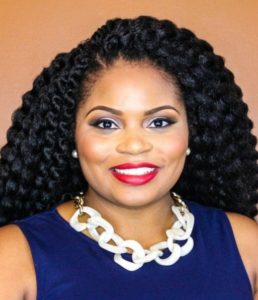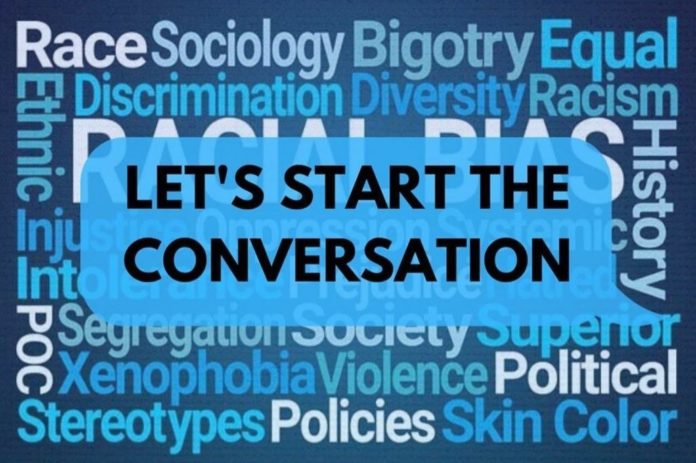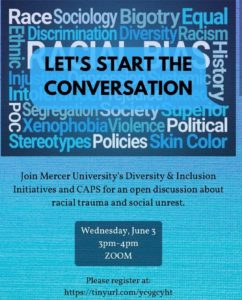As social unrest spread across the country last weekend, Dr. Ansley Booker started getting messages.
Dr. Booker is director of Diversity and Inclusion Initiatives at Mercer University, and students and staff were reaching out to her about their feelings of fear, anger, frustration, depression and trauma in the wake of nationwide protests stemming from the killing of George Floyd in Minnesota. Floyd died May 25 after an officer arresting him pressed his knee onto Floyd’s neck. His death was ruled a homicide.

“A lot of people of color and indigenous individuals have been suffering from racial trauma or race-based traumatic stress for decades,” Dr. Booker said. “This stress is the cumulative effects of racism on an individual’s mental and physical health and has been linked to feelings of anxiety, depression and suicidal ideations as well as other health issues. It is a direct result of years of oppression, racism, systematic injustices, bias and discrimination.
“These are ills of our society that have gone unaddressed for centuries. The civil unrest seen in our nation, where all 50 states and the world have protested police brutality and racism, is the culmination of all of these issues.”
That’s on top of the stress, disparities, racism, xenophobia and discrimination many people of color already were feeling as it related to the COVID-19 pandemic, she said.
To help students cope with their feelings, Diversity and Inclusion Initiatives and Counseling and Psychological Services will be holding a series of open discussions about racial trauma and social unrest on Zoom. The first session was June 3. They will continue each Wednesday, through at least June 24.
“We decided to have a safe space where students feel they can share their ideas, their thoughts, their anger, their hurt, their depression, their silence,” Dr. Booker said.
All sessions will start at 3 p.m. and are expected to last one hour. Follow Mercer University Diversity and Inclusion on Facebook or @mudiversityinclusion on Instagram for information about how to register. Some of the later sessions will focus on allyship, educational resources, advocacy and dismantling systemic injustices.
The sessions will give students the “opportunity to share and to listen and connect as well as learn healthy ways of managing the emotional experience and toll this is taking on individuals,” said Corey Wetzel, assistant director of Counseling and Psychological Services.
On June 5, the conversation will turn to solutions during a Forum on Racial Injustice, co-sponsored by Diversity Inclusion Initiatives and Mercer URGE, a student group that advocates for social justice. The forum will meet at 5 p.m. on Zoom. Follow Diversity Inclusion Initiatives on social media for more information.
“The purpose of the forum is to provide a space for Mercer students to speak about the effect of racial injustice on our specific Mercer community,” said Adri Rosario, a rising junior triple majoring in history, Southern studies and Spanish, who is helping organize the event for Mercer URGE. “It is to acknowledge the fact that racial injustice has a long history and to keep Mercer accountable and prevent the University’s perpetuation of racism.”
The event will be student-centered in terms of discussion, but faculty and staff are invited to listen and share important insights, she said.
“Students are essential to informing the school on what needs to get done,” Rosario said. “We need to learn how to center black voices while talking about racial injustice, but we also need to learn that it is not the responsibility of our black students or our students of color to constantly educate us when we have the resources at our fingertips in the age of the internet.”
Dr. Booker said a lot of students want their voices heard and they want ways to move their communities and Mercer forward through constructive activities, programming, training and dialogue.
“For so long they feel like they’ve been helpless; they’ve been powerless; they’ve been voiceless,” she said. “These things may not happen to them at Mercer, but it’s happening to them outside in their community.”
She said she’s proud of how Mercer students, faculty and staff have responded to this weekend’s events.
“They were publicly addressing what was happening in the country over the weekend by making statements, by providing solidarity,” she said.












